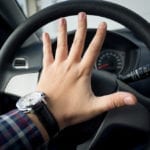 Car Horns. They give you a voice when you have something important to say, but you are inside a vehicle where no one except your dog can hear you. Horns should only be used in specific scenarios. Here is a short crash course on some helpful messages you can relay using your horn, as well as the unhelpful messages that at best, make you “one of those people” on the road, and at worst, compromise someone else’s safety.
Car Horns. They give you a voice when you have something important to say, but you are inside a vehicle where no one except your dog can hear you. Horns should only be used in specific scenarios. Here is a short crash course on some helpful messages you can relay using your horn, as well as the unhelpful messages that at best, make you “one of those people” on the road, and at worst, compromise someone else’s safety.
Do use your horn to say:
- “You can go!” When the red light turns green, and the vehicle in front of you is still stationary, wait a couple of seconds to make sure there isn’t a last-minute pedestrian sprinting across the street or an obstruction blocking their way, and then give a short beep to wake up the driver.
- “You are encroaching on my personal bubble!” Sometimes, drivers start drifting ominously towards the side of your vehicle while looking in the wrong direction. This often happens in the chaos of congested, fast-moving traffic. It might be because the driver didn’t shoulder check first and can’t see you in their blind spot, or they’re driving while distracted and don’t notice that they are veering left. A solid beep will suffice to get their attention and steer them back into position.
- “Watch out!” It’s ok to honk if you notice a pedestrian wandering into danger. For example, they might be heading into the path of a vehicle backing out of a parking stall. Keep in mind that a car horn is much louder to a pedestrian than it is to a driver in a car, so keep it light.
- “I support you!” Give a small supportive toot when passing by a charity event.
Do not use your horn to say:
- “Everybody move faster!” Surprisingly, traffic jams cannot be solved by laying on the horn. Everyone else would also like to be moving faster, it’s just that they can’t. While we’re here, a horn should never be sounded for longer than a split second. Holding it down for an extended period of time is irritating and stressful for those around you.
- “Go go go!” Avoid using your horn as a knee-jerk reaction. In the scenario above, where a vehicle is slow on the uptake at a green light, a driver’s first instinct should not be to honk immediately. There could be a perfectly good reason the vehicle in front isn’t moving. There may be a car in the intersection, or a pedestrian still crossing. Wait a couple of seconds before using your horn.
- “You’re a terrible driver!” If you think a driver is dangerous on the road, it is best to call the police. Honking at them will not instantly transform them into better drivers. More importantly, if they are not confident, to begin with, a blaring horn may rattle them further, increasing the likelihood that they’ll cause an accident.
- “I know you! Look at me!” Honking to get the attention of someone you know in another vehicle just calls the attention of all the other drivers surrounding you. It may just be needless, or it may cause confusion and an accident in faster traffic.
- “Hey cyclist, get out of the way!” Do not honk your horn at a cyclist or a pedestrian, unless they are in immediate danger. Cyclists are unstable and more vulnerable than vehicles, and honking loudly at them can cause them to crash.
 Jason Baxter
Jason Baxter